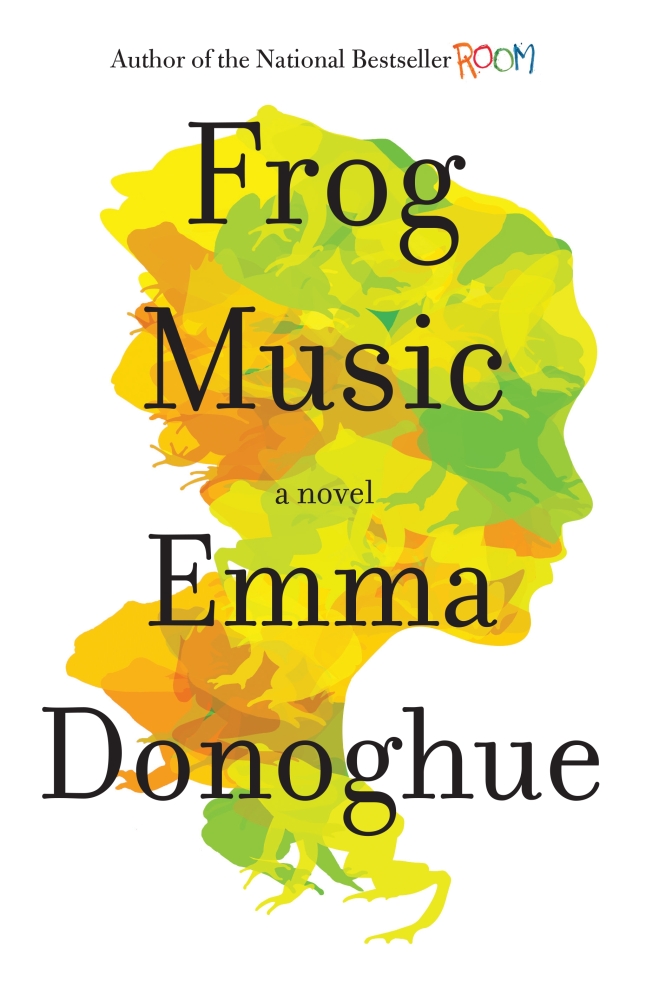Emma Donoghue’s latest novel has many facets, all of them fascinating. Like her short-story collection “Astray” and her novel “Slammerkin,” “Frog Music” is a detailed slice of historical drama, this time set in the festering boomtown of San Francisco in 1876.
Like her hair-raising best-seller “Room,” it incorporates the elements of a thriller; in fact, there’s enough of a puzzle here for it to qualify as a full-blooded mystery (Donoghue herself refers to “Frog Music” as a crime novel in an author’s note).
Best of all, there’s Donoghue’s familiar and intricate examination of women in impossible circumstances, bound to repugnant men for survival but never broken by them.
Like the works in “Astray,” “Frog Music” is based on a true story, this time about the unsolved murder of a cross-dressing frog catcher named Jeanne Bonnet, here called Jenny. (If you can resist the phrase “cross-dressing frog catcher,” you really need to examine your lack of curiosity.)
In the book, as in life, Jenny is shot through the window of a boarding house in the novel’s opening pages, in the company of Blanche Beunon, a burlesque dancer and prostitute.
Inspired by an account of this crime she read years ago in a museum gift shop book, Donoghue takes this event and puts her formidable, eloquent mark on it. In her version, Blanche’s survival seems random chance: She’s only spared because she bent down.
She has known Jenny for only a few weeks when she dies – they met when Jenny ran her down on a bicycle – and their friendship has hit a difficult spot.
Still, Blanche grieves, and her sorrow gives way to outrage. She spends the next several days trying to track down Jenny’s killer, sure she was the intended victim.
Her main suspects are her estranged, dandified lover Arthur and his sidekick Ernest, freeloaders and former acrobats who gamble away Blanche’s earnings. Furious at her refusal to work so she can care for her infant son, they spirit the child away, leaving a frantic Blanche to search for him, too.
Blanche acts as a guide through the seamy, steamy city by the bay, which is undergoing a brutal, uncharacteristic heat wave and a massive smallpox outbreak. Both plagues have set the citizens on edge, as have long-simmering tensions against Chinese workers filling the city’s tenements.
Donoghue revisits an older and in some ways more horrifying version of the shed where a small boy grows up captive in “Room,” exposing the shocking practice of baby farming, in which unsavory individuals are paid to take in unwanted infants – and then treacherously neglect them.
But Blanche learns rescuing her child from this hell is no easier than leaving him to wither and die. Donoghue isn’t blind to the demands of motherhood, and some of the book’s best sequences involve the impatient, inexperienced Blanche, used to catering to the dark tastes of men, trying to decipher the whims of a baby.
Colorful French slang and period songs – both of which have their own glossaries in the book – flow through the novel lyrically, making the era as vital as the plot. Donoghue is as acrobatic with her storytelling and language as Arthur and Ernest were flying high above the heads of their audience, and she paints the stinking city vividly.
The mystery isn’t merely about who shot Jenny; there’s also the question of the person Blanche will become. Will she stay a prostitute? Or will she break free from the men controlling her?
“She is different these days, one way or another; she knows that,” Donoghue writes. “(H)as this older, harder Blanche been hidden inside her all along?”
Early on, Jenny had told her, “If you meet an obstacle you can jump free.” She’s talking about riding the bicycle on crowded city streets, but by the novel’s end, Blanche sees another, more important lesson. “(N)ot always,” Blanche thinks. “You have to allow for some damage.”
Damaged or not, she has a choice, one that will keep you riveted as you make your way through this vibrant and remarkable novel.
Copy the Story LinkSend questions/comments to the editors.



Success. Please wait for the page to reload. If the page does not reload within 5 seconds, please refresh the page.
Enter your email and password to access comments.
Hi, to comment on stories you must . This profile is in addition to your subscription and website login.
Already have a commenting profile? .
Invalid username/password.
Please check your email to confirm and complete your registration.
Only subscribers are eligible to post comments. Please subscribe or login first for digital access. Here’s why.
Use the form below to reset your password. When you've submitted your account email, we will send an email with a reset code.